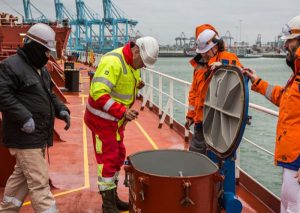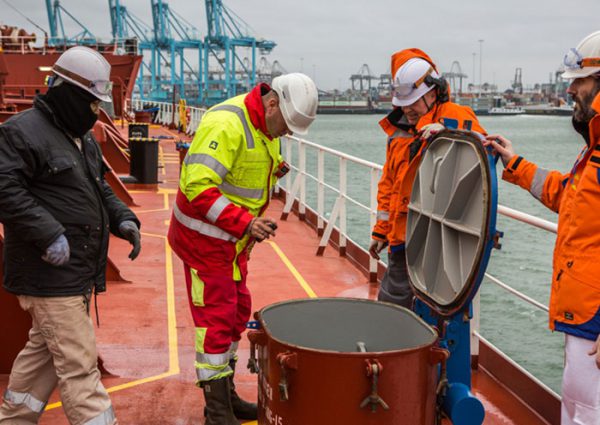Marine/Ship surveying and quality assurance refer to the process of evaluating the condition of ships and marine structures to ensure they comply with safety, environmental, and other regulatory requirements. Marine surveyors are professionals who perform ship surveys and inspections, providing technical advice and recommendations to ship owners, operators, and insurers. The ship survey process typically involves a comprehensive examination of the vessel’s structure, machinery, electrical systems, navigation equipment, and safety systems. This may include visual inspections, non-destructive testing, and performance testing. The surveyor will also review the ship’s documentation, including certificates, manuals, and logbooks, to ensure compliance with relevant regulations and standards.
Quality assurance is an essential component of ship surveying and involves ensuring that the survey process is conducted in a consistent and reliable manner. This includes developing standard operating procedures, conducting regular training and performance evaluations, and maintaining accurate records. Marine/Ship surveying and quality assurance are critical to ensuring the safety and environmental compliance of ships and marine structures. This is particularly important in the shipping industry, where vessels are subject to a wide range of regulations and standards, including those related to safety, pollution prevention, and security. Proper surveying and quality assurance can help prevent accidents, reduce environmental impacts, and minimize liability risks for ship owners and operators.

Continuous Survey of Machinery (CSM)
Continuous Survey of Machinery (CSM) is a crucial inspection that ensures the safe and efficient operation of a ship’s machinery. It is conducted throughout the life of the ship by qualified marine surveyors or experienced engineers who are knowledgeable about the ship’s machinery. During the survey, the surveyor inspects various components, including engines, generators, boilers, and auxiliary equipment, to ensure they are operating correctly and within the recommended parameters. The surveyor examines the machinery for signs of wear and tear, corrosion, leaks, and other signs of damage or deterioration. They also verify that the machinery is being maintained according to the manufacturer’s guidelines and that the ship’s crew is properly trained to operate and maintain the equipment. Conducting a continuous machinery survey is a vital part of a ship’s maintenance program as it identifies potential problems early, reduces the risk of accidents or breakdowns, and minimizes downtime. The survey helps ensure compliance with international regulations such as the International Safety Management (ISM) Code, which requires regular inspections and surveys of the ship’s machinery and equipment.
Classification societies such as LR, ABS, DNV-GL, BV, and others, which are members of the International Association of Classification Societies (IACS), mandate that all machinery under their rules undergo a survey every five years. To ease the burden of this heavy workload, Classification Societies allow some items to be surveyed in rotation over a number of annual cycles. This is known as the Continuous Survey of Machinery (CSM), where surveys are conducted continuously over a five-year cycle of surveys. In order to reduce costs for Owners/Operators, Class permits the Chief Engineer to survey most items under his supervision. However, the Class Surveyor must still credit the surveys during an annual audit. Class will instruct the Chief Engineer on which items he is eligible to survey on their behalf and which specific items he cannot survey. To maximize the manpower on-board ships, it is advisable to overhaul items that are due for survey. Since the time when overhauls are due can be influenced by operational practices, the Chief Engineer should ensure that both the overhaul or planned maintenance routine and the survey are due within the same time period. This will help optimize resources and minimize downtime.
Overall, the continuous machinery survey is an essential component in maintaining the safety and efficiency of the ship’s machinery, helping to ensure that it operates safely, smoothly, and efficiently throughout its life.
Ship classification societies
Ship Classification Societies such as LR, ABS, DNV-GL, BV, and others are organizations that set technical standards for the design, construction, and maintenance of ships and offshore structures. They ensure that vessels meet safety and environmental regulations and are fit for purpose. Classification societies also offer certification services for shipbuilders, shipowners, and operators to demonstrate compliance with regulations and best practices.
The International Association of Classification Societies (IACS) is an association of twelve major ship classification societies worldwide. Its role is to promote the developing and applying common rules, standards, and procedures among its member societies. IACS also works with international organizations such as the International Maritime Organization (IMO) and the International Organization for Standardization (ISO) to develop and maintain standards for the maritime industry. IACS plays a critical role in ensuring the safety and sustainability of the global shipping industry. Its members conduct surveys and inspections of ships and offshore structures to verify compliance with international regulations and IACS standards. They also provide technical advice and support to shipbuilders and owners on design, construction, and maintenance issues. IACS is committed to continuous improvement and innovation in the maritime industry, working to develop new technologies and solutions to address emerging challenges and promote sustainable shipping.
Prepared by MaritimEducation team.

